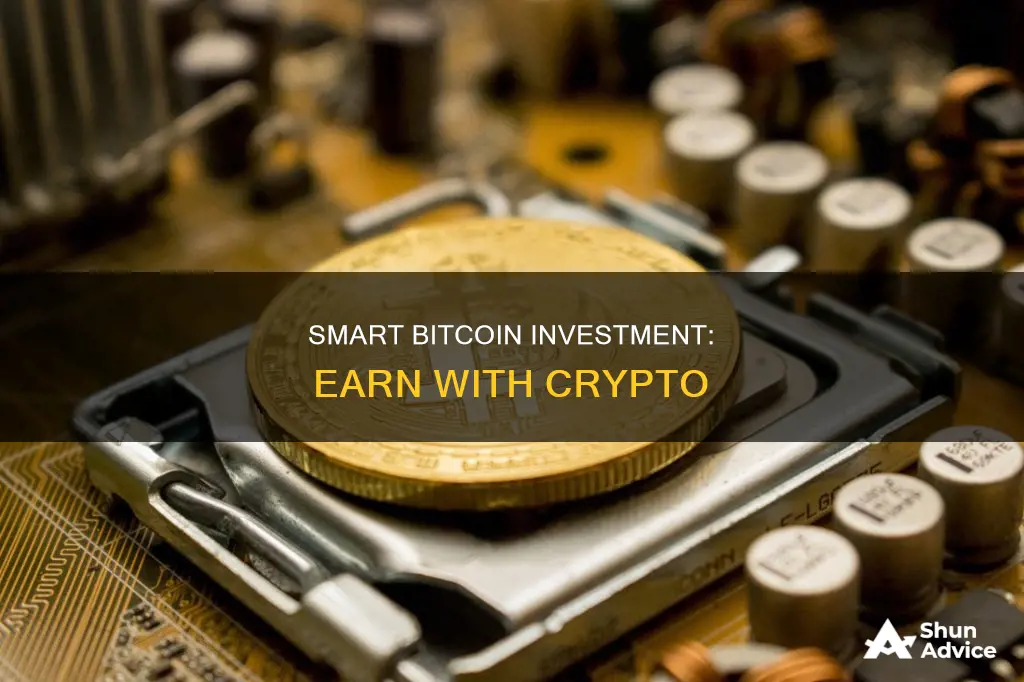
Bitcoin is a form of virtual currency that uses blockchain technology to handle transactions. It is one of the most widely used types of cryptocurrency. While there are many ways to earn or make money with Bitcoin, there are no free meals. Earning Bitcoin online takes time and money, and most methods promising free Bitcoin will not be worth the time wasted on them.
- Mining: One of the most common ways to earn Bitcoin is by solving cryptographic puzzles, which helps to add new blocks to the blockchain network.
- Trading: One of the fastest and riskiest ways to make money with Bitcoin is by trading it. This involves buying Bitcoin when the price is low and selling it when the price rises.
- Lending: Bitcoin lending platforms connect borrowers who need crypto with crypto owners who lend their coins for an interest rate.
- Accepting payments or tips: If you accept payments or tips for side gigs or a business, you can give people the option to pay in Bitcoin.
- Interest-bearing accounts: If you already own cryptocurrency, you can deposit it in an interest-bearing account and gain interest on it.
- Credit card rewards: Some credit cards offer crypto rewards programs, allowing you to earn Bitcoin by spending.
- Writing about Bitcoin: If you have a knack for writing, you can consider becoming a crypto journalist or article writer.
- Staking: Some cryptocurrencies allow you to lock up a portion of your holdings to participate in transaction validation on their network. This is called staking, and it's an energy-efficient alternative to mining.
- Playing online games: There are many play-to-earn crypto games, such as Axie Infinity and Decentraland, which can be a source of income.
- Yield farming: You can connect your cryptocurrency wallet and commit coins and tokens to a lending pool with other users on some decentralized finance (DeFi) platforms and decentralized exchanges (DEXs).
- Bitcoin ETFs: These allow investors to gain exposure to crypto in a retirement account, although they come with some downsides, such as not being able to spend the Bitcoin or store it in a cold wallet.
| Characteristics | Values |
|---|---|
| How it works | Bitcoin uses blockchain technology to handle transactions between users on a decentralised network. Transactions are placed on a public ledger and every transaction is stored in a unique block which gets attached to the main blockchain. |
| Security | Blockchain technology makes transactions secure, transparent and safe, without involving intermediaries such as the government or banks. |
| Value | The value of Bitcoin is dependent on market demand. When there are more people buying Bitcoin, the value will increase. |
| Risk | Bitcoin is a very high-risk investment because it’s a volatile asset. That means that Bitcoin values may rise or fall dramatically in value over a very short period. |
| Investment methods | You can invest in Bitcoin by purchasing it on an app or exchange, investing in a company that uses Bitcoin technology, or participating in Bitcoin mining. |
| Other ways to earn | You can earn Bitcoin through mining, lending, trading, writing about Bitcoin, completing small tasks, or accepting Bitcoin as payment for goods or services. |
What You'll Learn

Bitcoin mining
Bitcoin is a cryptocurrency that runs on a decentralised computer network or distributed ledger that tracks transactions in the currency. When computers on the network verify and process transactions, new bitcoins are created, or mined. These networked computers, or miners, process the transaction in exchange for a payment in Bitcoin.
Bitcoin is powered by blockchain, which is the technology that powers many cryptocurrencies. A blockchain is a decentralised ledger of all the transactions across a network. Groups of approved transactions together form a block and are joined to create a chain. Think of it as a long public record that functions almost like a long-running receipt. Bitcoin mining is the process of adding a block to the chain.
In order to successfully add a block, Bitcoin miners compete to solve extremely complex math problems that require the use of expensive computers and enormous amounts of electricity. To complete the mining process, miners must be the first to arrive at the correct or closest answer to the question. The process of guessing the correct number (hash) is known as proof of work. Miners guess the target hash by randomly making as many guesses as quickly as they can, which requires major computing power. The difficulty only increases as more miners join the network.
The computer hardware required is known as application-specific integrated circuits, or ASICs, and can cost up to $10,000. ASICs consume huge amounts of electricity, which has drawn criticism from environmental groups and limits the profitability of miners.
If a miner is able to successfully add a block to the blockchain, they will be rewarded with bitcoin. The reward amount is cut in half roughly every four years, or every 210,000 blocks.
One way to share some of the high costs of mining is by joining a mining pool. Pools allow miners to share resources and add more capability, but shared resources mean shared rewards, so the potential payout is less when working through a pool.
To start mining Bitcoin, you will need a wallet, mining software, and computer equipment.
The majority of the Bitcoin network mining capacity is owned by large mining firms and pools. It is still possible to participate in Bitcoin mining with a regular at-home personal computer if you have one of the latest and fastest graphics processing units. However, the chances of receiving any reward by mining on your own with a single GPU in your computer are minuscule. You'll need to find a mining pool to increase your chances.
Like all cryptocurrencies, Bitcoin has no intrinsic value. It’s not backed by any physical asset, like gold or silver, and there’s no central regulator to ensure that the value remains stable. Furthermore, Bitcoin value isn’t linked to the profits of any one corporation. The value of Bitcoin is dependent on market demand. When there are more people buying Bitcoin, the value will increase, and when there are fewer people buying, the value will decrease.
Investors Betting on Bitcoin: How Many?
You may want to see also

Trading Bitcoin
To get started, you will need to join a Bitcoin exchange, get a Bitcoin wallet, connect your wallet to a bank account, and place your Bitcoin order.
When trading Bitcoin, you can use several strategies, such as:
- Buy and 'Hodl' (hold on for dear life): This strategy involves buying Bitcoin and holding onto it for the long term, regardless of price fluctuations.
- Long-term holding: Similar to the above, but investors may sell once they are satisfied with the returns.
- Short-term trading: This strategy involves riding the ups and downs of Bitcoin's price volatility, buying at the dips and selling at the peaks.
It is important to note that trading Bitcoin successfully requires knowledge of the market and an understanding of how to mitigate risks. It is also crucial to carefully determine your risk tolerance and investment strategy before investing in Bitcoin or any other cryptocurrency.
Dogecoin Investment: Worthy or Wasteful?
You may want to see also

Bitcoin lending
Centralized exchanges, such as BlockFi, Nexo, and ZebPay, act as intermediaries by matching lenders with borrowers. These platforms then pass on the interest of these loans to lenders as yield rewards. Crypto lending platforms can also be decentralized, such as Aave, Compound, and dYdX, where smart contracts automate the lending and borrowing processes.
Bitcoin Investment Bots: How Long Do They Last?
You may want to see also

Accepting Bitcoin payments
Accepting bitcoin and other cryptocurrencies as a business owner can be a simple addition to your business that will increase the number of payment methods available to your customers and may also decrease your overall transaction fees.
Reasons to Accept Bitcoin Payments
There are several reasons a business owner may want to accept bitcoin payments:
- Save money on credit card processing fees: Credit card processing fees—usually between 3% and 4%—are a big expense for merchants. Bitcoin transactions do not require a processing fee (though crypto payment gateway merchants will charge a 1% fee).
- Transact with new and international customers: Offering bitcoin as a payment method will open your business to new customers and make it easier to transact with international customers without paying steep international fees.
- No risk of chargebacks or disputes: Bitcoin works similarly to cash in that all payments are final. This means that, as a merchant, you will not have to worry about paying steep chargeback fees or dealing with payment disputes.
Pros and Cons of Bitcoin Payments
Pros
- Fewer transaction fees
- No risk of chargebacks
- May attract more customers who prefer bitcoin as a method of payment
- Holding bitcoin in an account could serve as an investment opportunity
Cons
- No fraud protection offered
- Bitcoin transactions can take time to process (ten minutes or more) depending on the current network activity
- No merchant support to answer questions
Bitcoin Payments vs. Credit Card Payments
Bitcoin Payments
- Processed on the blockchain
- Up to 1% transaction fee, depending on whether the merchant uses a payment tool
- No option to communicate with customer support to handle disagreements between merchant and client or to resolve payment issues
- Customers cannot charge back transactions
Credit Card Payments
- Processed through a payment processor
- Processing fees range from around 3% to 3.5% (higher fees for high-risk merchants)
- Access to credit card merchant support; credit card companies generally side with the customer during disputes
- Merchant fees for customer chargebacks
Bitcoin and Crypto Payment Providers
Bitcoin and cryptocurrencies, in general, are volatile. If you accept them as a business owner, you’ll want to make sure you are converting your payment to US dollars quickly or holding the crypto as part of a long-term investment plan. These payment gateways can convert your crypto payments to cash automatically:
- Coinbase: Charges a 1% transaction processing fee. The exchange rate is locked for customers once they initiate the payment until they check out.
- BitPay: Charges a 1% transaction fee to process payments. When a customer begins a payment, BitPay locks in an exchange rate available to the customer for 15 minutes.
- PayPal: Makes it easy for customers to pay using their cryptocurrencies. PayPal will automatically convert crypto to US dollars for the merchants.
How to Accept Bitcoin Payments in 5 Steps
The process to accept bitcoin payments for your business will vary slightly depending on which online platforms you are already using. Here are the basic steps to follow:
- Understand Bitcoin Regulations in Your Area: Speak to an accountant so you understand the tax implications of accepting bitcoin or other cryptocurrencies, as regulations vary by state and country. Regulations may change how you plan to record bitcoin payments in your overall accounting systems.
- Set Up a Crypto Wallet or Gateway: You’ll want to set up a crypto wallet or gateway. A wallet will keep your money as cryptocurrency, while a payment gateway will allow you to easily exchange crypto for US dollars. Gateways are an easier option that offers more flexibility since you can keep your bitcoin or convert it.
- Enable Bitcoin Payments on Your Checkout Process: Setting up bitcoin payments in your online store could be as simple as downloading a plug-in or app on your e-commerce platform. If this option is not available to you, you can integrate payments with HTML code from your wallet (both BitPay and Coinbase provide this).
- Integrate Bitcoin Payments With Your Accounting Software: You’ll want to make sure your bitcoin payments are being recorded in the same platform where you account for the rest of your business transactions. This can easily be set up by integrating bitcoin transactions with your current accounting software.
- Prepare for Crypto Volatility by Converting Bitcoin to Cash: The price of bitcoin is always changing and can be volatile. If you plan to accept bitcoin for your business, either plan for huge fluctuations in price value or plan to convert bitcoin payments to cash immediately when you receive them. This will shield you from potential price drops.
Tom Brady's Bitcoin Investment: Did He Make the Right Move?
You may want to see also

Yield farming
There are different ways to yield farm, but the most common involve depositing crypto assets in either a decentralised lending or trading pool to provide liquidity. In exchange for providing liquidity to these platforms, liquidity providers (LPs) earn a certain annual percentage yield (APY), which is usually paid out in real-time.
Benefits of Yield Farming
- Passive income: Rather than just holding, users can put their holdings to work and earn rewards in the form of additional tokens and fee income without actively trading.
- Liquidity provision: Yield farming enables efficient trading and reduces slippage on DEXs. By providing liquidity, users play a crucial role in the functioning of the DeFi ecosystem.
- High yields: Some DeFi projects offer attractive yields that exceed traditional financial instruments. Depending on market conditions, users can potentially earn substantial returns on their capital.
Risks of Yield Farming
- Impermanent loss: Impermanent loss primarily occurs in AMMs because of the mechanism used to maintain balanced liquidity between the tokens in the pool. If the prices of the tokens in the pool change significantly after you’ve provided liquidity, the platform’s automated system may rebalance the pool by buying more of the cheaper tokens and selling the more expensive ones. This rebalancing action can result in a loss for yield farmers.
- Smart contract flaws: DeFi protocols are built on smart contracts. Hackers can exploit any bugs or vulnerabilities in the code, resulting in the loss of deposited funds.
- Fluctuating rates: Yields change based on supply and demand dynamics, which makes it hard to predict the potential rewards in the future. For example, yields can collapse as more people supply assets.
- Volatile prices: Cryptocurrency prices can be highly volatile, affecting the value of rewards and the assets you’ve deposited. If the token you are earning your rewards in drops significantly in value, all your profits could be eroded away.
- Regulatory risks: Regulatory bodies such as the SEC may attempt to oversee yield farming and issue cease-and-desist orders against crypto lending sites.
The Ultimate Guide to Investing in Ethereum and Bitcoin
You may want to see also
Frequently asked questions
Bitcoin is a form of virtual currency that uses blockchain technology to handle transactions between users on a decentralised network. Blockchain technology makes transactions secure, transparent, and free from intermediaries such as governments or banks.
You can invest in Bitcoin through a cryptocurrency exchange, such as Coinbase, Binance, or Kraken. You will need personal identification documents, bank account information, and a secure internet connection. You can also invest in companies that utilise Bitcoin technology or participate in Bitcoin mining.
Bitcoin is a very high-risk investment due to its volatile nature. The value of Bitcoin may rise or fall dramatically in a short period, and there is no central regulator to ensure the value remains stable. As with all investments, you may lose some or all of your money.







